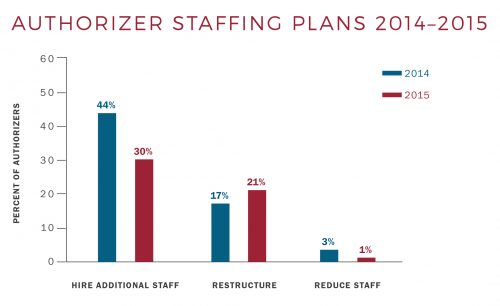As part of NACSA’s 2015 annual survey, we asked authorizers questions related to staffing in their offices, including future hiring plans and resources dedicated to authorizing. We encourage you to explore the full data release: Authorizing Data in Depth: Staffing.
This post explores what we know about authorizing the profession—big-picture staffing trends and voices from authorizers about the challenges and opportunities that lie ahead.
The Men and Women on the Frontline
On any given day, an authorizer can wear many hats. Leader. Firefighter. Communicator. Therapist. Regulator. Entrepreneur. Competitor. Advocate. These roles don’t even include the “other duties as assigned” many authorizers balance day in and day out.
Authorizing is not a nine-to-five job. Many start their morning before many have even had their first cup of coffee. They work into the night, fielding calls from board members, responding to parents, and catching up on the things that were actually on their daily to-do list. They take their work home with them, often lying awake at night thinking about a school that is failing to serve kids well or agonizing over an upcoming board decision.
The people doing this important work come from all walks of education reform and beyond. They are teachers, lawyers, policymakers, school leaders, and even business and non-profit professionals all committed to making a difference in the lives of children. Some actively seek the role of an authorizer, while others fall into it.
Regardless of their background, experiences, and environments, authorizers serve a critical role in the nation’s education reform movement. They are the guardrails in the charter school sector. When they do their work well, charter schools thrive. Kids have access to a better education and public funding is used well. When done poorly, failing schools continue to hurt students, taxpayer dollars are misused, and ultimately kids lose out.
Trends at the Office Level
This year’s annual survey data suggests authorizing staffing has not kept pace with charter school growth. In just four years, the ratio of schools per full-time staff member or equivalent (FTE) has increased by two-thirds (66%). On average, authorizing offices have one staff member for 10.59 schools in their portfolio.
In addition, the majority of authorizers surveyed reported they do not plan to hire additional staff in the coming year. This is a decline from 2014, however, some of this decline could be more authorizers deciding to restructure their offices, which has increased slightly.
Outside of these trends, there is little consistency in authorizing staffing patterns. Staffing varies significantly among authorizer types, with Not-for-Profit authorizers on the high end (four schools per FTE) and State Education Agencies at the low end (12 schools per FTE). The number of schools in an authorizer’s portfolio compared to its number of FTEs varies considerably as well, even for authorizers managing the same number of schools. For instance, in the graphs below we see for authorizers managing around 80-100 schools in their portfolio, staffing numbers range from about 5 to more than 50.
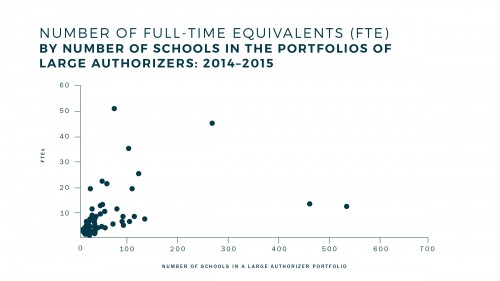 |
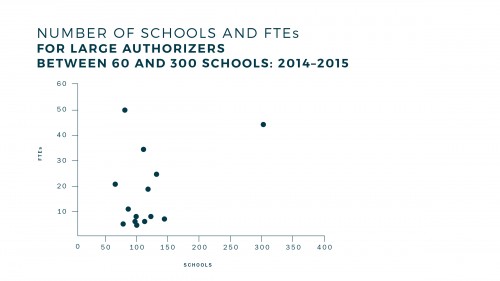 |
Click to enlarge
Voices from Day-to-Day Staff
At just 25 years old, authorizing is a young player in the grand scheme of the education world. Not that much different, in fact, than actual 25 year olds. Through the past quarter century, it has matured into a profession, translating the lessons and mistakes of its early years into tangible areas for advancement. The respect for authorizing is growing, and the role it plays in education reform is becoming undeniable.
To learn more about the challenges and opportunities authorizers face in executing their responsibilities, we turn to current and former authorizers from around the country:
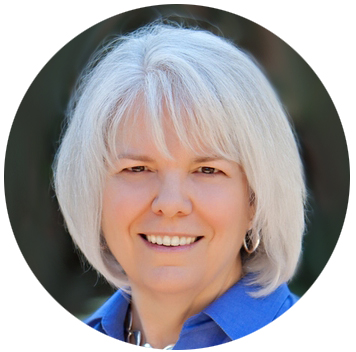 |
On the Challenges of Recruiting TalentIn California, 2/3 of the authorizers have only one or two schools in their portfolios. With so few schools and limited oversight funding, this means that the staffing for authorizing work is usually just a fraction of an already overwhelming district office job. In addition, the work is often sporadic—when a new application is submitted, a financial report arrives, or a complaint is made. Circumstances don’t allow the development of expertise, and what knowledge might be gained is lost when the superintendent “re-shuffles” central office assignments. Even those who take an interest in the field and develop their expertise don’t have much of a career ladder because there are so few “authorizer shops” in the state providing management level opportunities. Development of charter authorizing talent in California will take a focused effort, including both training and professional recognition. Gail Ann Greely, Director |
 |
On Retaining TalentRetaining top talent who are knowledgeable and passionate about their work is vital to our work as an authorizer. By making talent retention part of our organizational goals, the Center ensures that we continue to make quality personnel a priority for our organization. There will always be competing interests making it difficult to retain staff, but our team members are essential to our mission of transforming public education. Cindy Schumacher, Executive Director |
 |
On DiversityDiversity isn’t just about who does the work, it’s also about how. Charter school authorizing is not, and never should be, mechanical. Our work must be done with the utmost concern for quality and improvement, with the families we serve, not to them. There are no clear professional paths that lead to charter school authorizing. As a result, we rely on personal networks that sometimes miss the mark in identifying talented, diverse individuals from the communities we serve—whose inspiration and motivation for authorizing may be different from our own. Jarett Fields, Former Director |
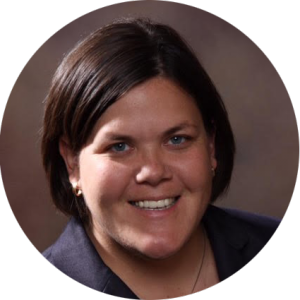 |
On Doing More with LessDoing more with less forces you to rethink the work, which can often result in greater efficiency. At CPS we’re focusing on the impactful work that will get us to the end goal: great educational options for students. We’re strategically organizing the Office of Incubation and Innovation to focus on standards of quality to ensure that valuable resources are utilized to their full extent. There is great power in working collaboratively with all charter authorizers and tapping into expertise at CPS, as well as around the country, that has often been underutilized. Mary Bradley, Executive Director |
What Lies Ahead
This data is just the start. NACSA is preparing to embark upon a year-long research project to explore authorizing staffing, the talent pipeline, and the qualities necessary to be an effective authorizing professional in a way we never have before. We look forward to working with authorizers as part of this work, learning from them and hearing their challenges and triumphs. We will be translating these data and stories into tools and resources to better help serve authorizers’ human capital needs today, tomorrow, and into the future.
Authorizers do important work. Our job is help them manage all of their hats effectively and ensure they have the resources they need to see that every child has access to a great education.

